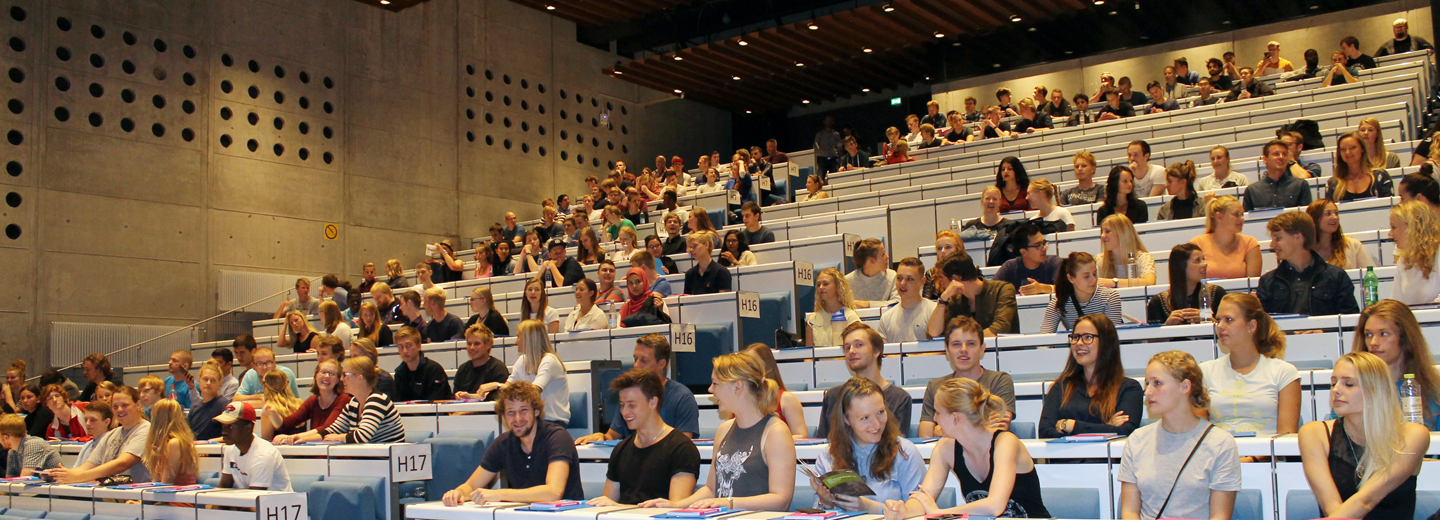
Enthusiastic study start - and an approved student intake
When SDU opened its doors for study year 2016, this year's new students received a few words from the Dean, and once again, the Faculty could start the study year with an increased enrolment.
By Henrik Gautier, henga@sdu.dk
True to tradition, there was a high level of activity as 591 new students arrived for study start at the Faculty of Science on 31 August, and the Faculty's dean, Martin Zachariasen, bid the 'freshers' welcome.
"And you should remember your enthusiasm. Just as you can be inspired by a film, a concert or any number of things, you will be inspired by reaching an academic target through hard work - and you should enjoy it," said the dean in his welcome speech to the almost 600 young men and women, who closely reflected the perfect gender ratio target by being close to fifty-fifty.
Video and welcome dance
The auditorium lights were dimmed, and once again the year's tutors outdid their predecessors with an impressive show. In a blend of video and live performance, the 'freshers' sat down to an energetic, humorous and self-ironic presentation of the Faculty and its study programmes. They laughed loud and long, and there was rhythmic applause as the tutors ended with a self-choreographed dance routine to the heavy beats pumping out of the loudspeakers. Nobody can accuse the students at Science of being boring!
No sooner had the tutors taken their final bow, before they left the auditorium with the 21 stem classes. The rest of the day unfolded with the usual activities, such as purchasing books, guided tours, photographing the stem classes and team building. On Thursday, the programme consisted of an introduction to the departments and teachers before the students rounded off the day in their study groups along with the body of study group supervisors. The legendary Science Rally run took place on Saturday, when a myriad of fun and challenging scientific tasks were completed at each of the run's posts, and the day culminated in a communal meal and a party in the Friday bar.

Thanks to the volunteers
Study start and the first days of introduction largely followed the same timetable as every year, and according to study start coordinator Camilla Gundlach Kromann, nobody has a bigger share in everything running smoothly than the tutors. The 67 older students work voluntarily to give the new students a great welcome and a competent introduction to study life at NAT.
"None of this would be possible without the volunteer tutors. There are a lot of staff members who work hard leading up to the study start, but the study start events would simply not be possible without the body of tutors. They know how it is to start at university - so they are the experts," says Camilla Gundlach Kromann and adds:
"Students typically sign up to become tutors because they are serious about it. They have something to offer and want to pass on their own experiences to others. I think that is unique, and I can't imagine what we would do without the tutors' engagement, joy, energy and great competency," says NAT's study start coordinator.
Satisfaction with intake numbers
Every year there is great excitement when the numbers of new students starting the study programmes are released. Also this year, when the final number ended up at 591 new Bachelor students at NAT. The number is equal to last year's record intake, and Head of Office Niels Kring from the Science faculty secretariat is satisfied.
"When you look at national trends, we are doing marginally better than the other scientific study programmes in the country," says Niels Kring and continues:
"There have been more applications to most of our study programmes than in 2015. Study programmes such as Pharmacy, Biomedicine and Biology are experiencing the effect of self-selected and imposed dimensioning. Putting a ceiling on how many students we can enrol means raising the average grade for admission for our new students. We are of course not happy about having to reject potentially talented students, but that is the reality we face," says the head of office.
The intake at Science has significantly increased in recent years, with a high increase of percentage each year, although not this year. Niels Kring offers an explanation:
"We can see that the engineering study programmes have seriously taken off and have a significant improvement of around 20 percent. I think that is the explanation for our improvement being relatively small this year. Having said that, we are not complaining and I see no reason to be worried about future intake, because all projections indicate that for many years hence, society will need more graduates with a scientific education. We know this increasingly has a bearing on young people's choices of study programme, so our communication will need to have even more focus on emphasising career opportunities," says Niels Kring.
Photos: Henrik Gautier/SDU